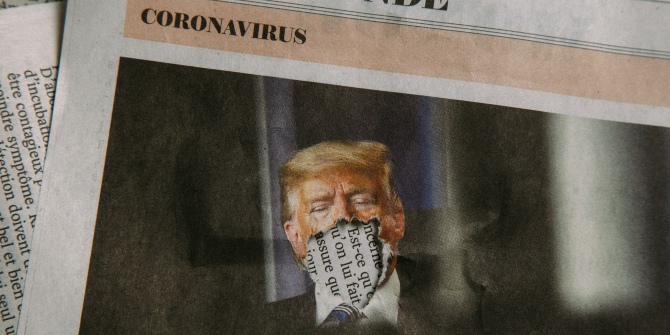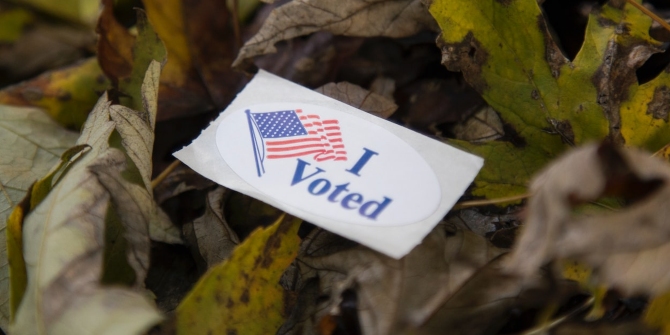 This election year, President Trump has faced significant criticism not only for his response to the COVID-19 pandemic, but now also for his reaction to the renewed #BlackLivesMatter protests that began after the death of George Floyd in Minnesota last month. Thomas Gift writes that although Trump now trails his Democratic challenger, former Vice President Joe Biden, in many crucial swing states, it’s premature to suggest that his core base of Republican supporters have deserted him.
This election year, President Trump has faced significant criticism not only for his response to the COVID-19 pandemic, but now also for his reaction to the renewed #BlackLivesMatter protests that began after the death of George Floyd in Minnesota last month. Thomas Gift writes that although Trump now trails his Democratic challenger, former Vice President Joe Biden, in many crucial swing states, it’s premature to suggest that his core base of Republican supporters have deserted him.
In the wake of COVID-19 and the recent Black Lives Matter protests, what do Trump’s polling numbers look like currently?
Trump has certainly suffered in the polls of late, and—with less than five months till voters cast their ballots in November—his re-election team has to be concerned with the direction he’s trending. National averages from Real Clear Politics have former Vice President Joe Biden with a significant 8 percentage point lead over Trump. A recent CNN poll even showed Biden outpacing the president by a full 14 percentage points. When breaking down those numbers by key battleground states like Michigan and Wisconsin, analysis from 538 suggests that the picture looks equally discouraging for Trump. Yet in a frenzied political atmosphere that can change at a moment’s notice, it’s difficult to speculate whether these polls are a clear harbinger of what will happen in November. Any number of unexpected events—from continued swings in the economy, to the unpredictabilities of COVID-19, to changes in public perceptions of the Black Lives Matter protests—could reshape the dynamics of the race.
With Trump’s poll numbers trending downward, is it possible that support from his notoriously loyal base is starting to fade?
Some Trump critics have predicted that recent missteps by the president—over his handling of COVID-19, the Black Lives Matter protests, and so on—will be the president’s downfall. That may well be true. Recent weeks have seen mounting criticism of the president—even within the GOP—and it’s easy to see how this might scupper Trump’s re-election bid. Yet we should also remember that many critics predicting cracks in Trump’s base have made similar forecasts before—for example, during the Mueller investigation and during impeachment over Ukraine earlier this year. Each time Trump, managed to maintain support among Republican loyalists—and sometimes even emerge stronger after these fights. Data from Gallup show that the share of Americans who identify as Republican now compared to when Trump took office in January 2017 has declined just 3 percentage points. So while it’s possible that Trump’s support really doesn’t have a floor, there’s reason to be skeptical about that claim.
There’s so much going on at the moment politically in the United States. What do the polls say generally how Americans feel about where the country is headed?
For all the understandable talk about partisan polarization, Americans seem to be united about at least one point—that the country is facing momentous challenges. A recent Wall Street Journal poll, for example, revealed that 8 out of 10 Americans think that the nation “is spiraling out of control.” That’s a striking figure. Although the sources of that feeling are varied—and doubtlessly differ between Democrats and Republicans—much of the concern almost certainly stems from a common dynamic: distrust in the ability of government institutions to grapple with complex problems now confronting the United States. The situation is exacerbated by stark social inequalities, fears about an international pandemic that has left tens of millions of Americans out of work, and a president that has often sought to stoke rather than heal social divides. Whether these concerns will be enough to dull Trump’s support in November and mobilize Democratic turnout remains to be seen.
- “Reopen PA Rally – Harrisburg, PA” by Paul Weaver is licensed under CC BY NC SA 2.0
Please read our comments policy before commenting.
Note: This article gives the views of the author, and not the position of USAPP – American Politics and Policy, nor the London School of Economics.
Shortened URL for this post: https://bit.ly/2N8JahA
About the author
 Thomas Gift – University College London
Thomas Gift – University College London
Thomas Gift is a Lecturer of Political Science at UCL, where he teaches on Public Policy Economics and Analysis and is the Director of the Philosophy, Politics, and Economics (PPE) Programme. He is also a Visiting Fellow at the LSE US Centre.






